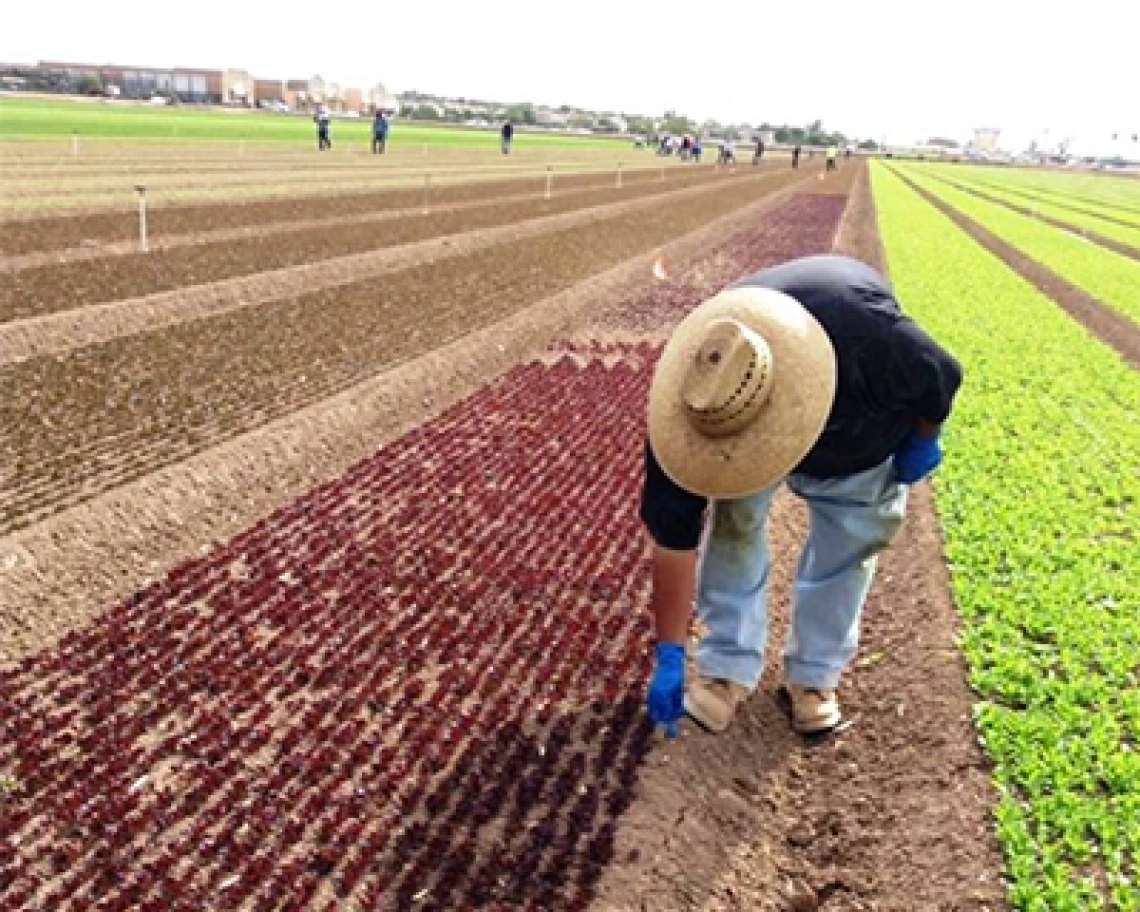UArizona Health Sciences Awarded $2.4M to Study Stress and Resilience in Vulnerable Latino Populations
The federal funding will allow researchers to develop programs that weigh cultural factors to promote better health outcomes in communities with high-poverty Latino populations in Yuma County, Ariz.

TUCSON, Ariz. – Seeking to better understand the complexities of positive and negative influences on Latino health outcomes, researchers at the University of Arizona Mel and Enid Zuckerman College of Public Health have been awarded $2.4 million from the National Institutes of Health (NIH) to study stress-related chronic disease in underserved populations in conjunction with health advantages that exist in those communities.

Agricultural workers harvest lettuce near Yuma, Arizona (Photo: Courtesy of CampesinosSinFronteras.org)
“Since the start of the COVID-19 pandemic, the College of Public Health’s leadership and expertise has been more visible and important than ever, and this study is an incredible example of why the college has such a well-deserved reputation of excellence,” said University of Arizona President Robert C. Robbins, MD. “The work of Dr. Carvajal and his team will allow us to better support the health and resiliency of underserved communities, and it is a vital contribution to the University of Arizona’s mission as one of only a few land-grant universities that are designated as Hispanic-Serving Institutions. I look forward to seeing the impact this will have across our state.”
The research project will identify cultural, social and behavioral factors that offer protection in a community with a complex picture of very high rates of diabetes and social conditions that cause stress, such as seasonal unemployment, physical challenges from farm work and lack of health coverage. Yet this population statistically holds other known health advantages relative to the U.S. population as a whole – thought to be rooted in cultural processes and social networks - the team plans to investigate. The more that public health experts can learn about such factors that lead to good health, even within difficult circumstances, the better they can develop health programming for this and other communities.

Scott Carvajal, PhD, MPH
“This award builds on the vital research being conducted by the Arizona Prevention Research Center that involves community health workers to help improve the health of underserved populations,” Dr. Carvajal explained. “The project will help us learn what cultural characteristics of communities, such as family support and social ties, help keep stress from causing chronic disease.”
In collaboration with community partners, the AzPRC leads the way with an innovative research approach that combines community participation and mixed-methods research.
This research approach will help develop new public health programs that benefit Mexican-descent populations, programs that may be applicable to other populations around the nation. Researchers will interview community members to learn what causes them stress and how they manage the stress they experience. Then they will evaluate stress among community members using questionnaires and measure key biological markers of stress and chronic disease. These results then will guide the development of programs to reinforce protective social ties, and concurrently the team will work with community partners to develop plans to mitigate the stress factors that cause the most harm.

Maia Ingram, MPH
In addition to the UArizona public health team and community partners, the project includes faculty members from the College of Nursing and the Department of Psychology in the College of Science. Dr. Carvajal added, “Although the project was planned before the COVID-19 pandemic, our team is aware it has intensified social and health inequities and simultaneously created new stressors. The best way to learn about these evolving stressors and identify protective strategies to mitigate their health effects is through research that sustains engagement with community health workers and the communities they represent.”

Ladies with Yuma’s Campesinos Sin Fronteras organization walk in support of U.S.-Mexico Border Health Commission’s Ventanillas de Salud program during charity event (Photo: Courtesy of CampesinosSinFronteras.org)
This research is supported by the National Institute on Minority Health and Health Disparities, an NIH unit, under award No. 1R01MD014150-01A1.
A version of this media advisory appeared originally at the UA News website.
# # #
NOTE: For photos and captions to this story, see: https://arizona.app.box.com/s/wfql2sq1qx5n8pffc2zluycx98k360n9.
About the University of Arizona Mel and Enid Zuckerman College of Public Health
Established in 2000, the Mel and Enid Zuckerman College of Public Health at the University of Arizona Health Sciences is the first nationally accredited college of public health in the Southwest. Today the college remains the only accredited college of public health in the state of Arizona, with campuses in Tucson and Phoenix. The college enrolls more than 1,100 students per year across degree programs at the bachelor's degree, master's degree and doctoral levels. Through research, education and community engagement, the UA Zuckerman College of Public Health continues to find solutions to public health problems in Arizona, the Southwest and globally. For more information: publichealth.arizona.edu (Follow us: Facebook | Twitter).
About the University of Arizona Health Sciences
The University of Arizona Health Sciences is the statewide leader in biomedical research and health professions training. UArizona Health Sciences includes the Colleges of Medicine (Tucson and Phoenix), Nursing, Pharmacy, and the Mel and Enid Zuckerman College of Public Health, with main campus locations in Tucson and the Phoenix Biomedical Campus in downtown Phoenix. From these vantage points, Health Sciences reaches across the state of Arizona, the greater Southwest and around the world to provide next-generation education, research and outreach. A major economic engine, Health Sciences employs nearly 5,000 people, has approximately 4,000 students and 900 faculty members, and garners $200 million in research grants and contracts annually. For more information: uahs.arizona.edu (Follow us: Facebook | Twitter | YouTube | LinkedIn | Instagram).

